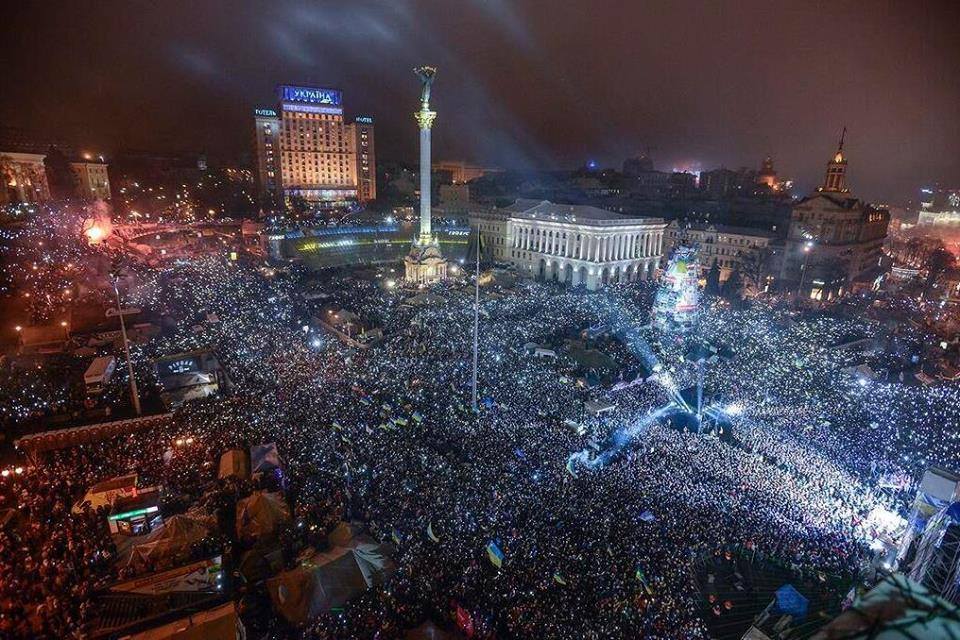Sometimes a simple statistic can highlight a fundamental change, and that is true of one from Ukraine. At present, 18 of 20 of the ministers in the Ukrainian government speak English, up from only two of 20 under Viktor Yanukovych, Vitaly Sych, the editor of “Novoye vremya” points out.
And that shift reflects broader changes in the politics and society of that country means, he argues, that “Ukraine has a historic chance” to transform itself into a European country “if it survives the war on the Eastern front” Moscow has imposed upon it.
In a speech to an Aspen Institute meeting in Berlin, Sych described the events of the past year and a half which he says have led to a “moment of truth” for Ukraine and for more than Ukraine as well.
The Ukrainian editor began his remarks by saying that “the lives of many Ukrainians switched into emergency mode on Dec.1, 2013. That day special police units beat up students who protested in the Maidan, Kiev’s main square, against ex-President Viktor Yanukovych’s decision not to sign an association agreement with the EU.
“Ukrainian television channels aired footage of police brutally beating up young girls and boys who were peacefully protesting on Maidan,” he continued. “The students were bleeding and shouting, some of them managed to escape only when they got inside the nearby churches. The next day a crowd of 100,000 outraged Ukrainians poured into Kiev’s streets.”
Their “protest was no longer about European integration—it was about justice and dignity. People demanded an apology and a punishment for those responsible for beating the protesters,” he said. But instead of apologizing, “Yanukovych responded with repressions turning a spontaneous protest into a marathon stand-off.”
Sych told the meeting that it was obvious to him at the time that “if we allow this to happen, we will turn into a bad version of Belarus for decades. There would be no elections in Ukraine, no economic competition, not even personal freedoms. We wouldn’t even get what I call a ‘freedoms in exchange for food’ pact.”
“A few days afterwards what was already called a Revolution of Dignity,” Sych said, “culminated in an ugly way. Special troops shot dead about 100 people right in the center of the capital, Yanukovych fled Kiev. Parliament cancelled the dictatorial laws. The next morning Yanukovych’s mansion … a symbol of corruption, opened its doors to general public.”
“The trouble seemed to be over. But it had just began,” Sych continued.
“A few weeks afterward Russia annexed Crimea and riots began in Eastern Ukraine. Armed people started capturing government buildings in Donetsk and Luhansk, some of them Russians, some of them locals. What was happening in Kiev was grim but was clear. The developments in the Crimea and Eastern Ukraine were beyond my understanding.”
“An anti-criminal revolution was shown as an aggressive offensive on anything that is Russian—culture, language, identity. The technique was simple: Russian media focused on a small radical wing of the revolution—it constituted less than 5%, the rest were young professionals, students, retirees—and blew it out of proportion mixing it with fakes and lies.”
“You would think such a primitive technology wouldn’t work in the 21st century when people have internet,” Sych said. “But it did. No wonder a lot of residents in Crimea and Russia started treating the Ukrainian revolution and Ukrainians themselves with suspicion, to say the least.”
“In a recent poll by the Moscow-based Levada Center polling agency, Russians included what they previously referred to as ‘brotherly Ukraine’ into the top three most hostile nations to Russia, along with the US and Latvia. Ukrainians replaced Georgia and Estonia in this honorary title.”
“Relations have deteriorated on the human level as well. My wife’s sister lives in Moscow for many years,” Sych said. “She is a Russian citizen. We find it difficult to communicate with her family and decided we should all take a pause. It is difficult to speak with people who are convinced black is white and vice versa.”
“Generally, most Ukrainians have been on a major emotional and financial stretch over the last year,” he added. On the one hand, “many have either participated in the war … or lost a relative or a friend.” On the other, “all have seen their income plummet as the exchange rate of the local currency, the hryvna, fell from 8 to almost 30 to a dollar.”
But, Sych continued, everyone has “a strong incentive to reform—a lack of alternative. If [the country doesn’t], Ukraine’s economy will collapse in a year or two. [The reforms] will include privatizing loss-making state companies, cutting red tape and easing the tax burden as well as putting corrupt people in jail.”
“Ukraine has now a historic chance to transform into a vast European nation with competitive economy and rule of law — if it can only survive on the Eastern front—its people have been in emergency mode for the last 15 months.”




